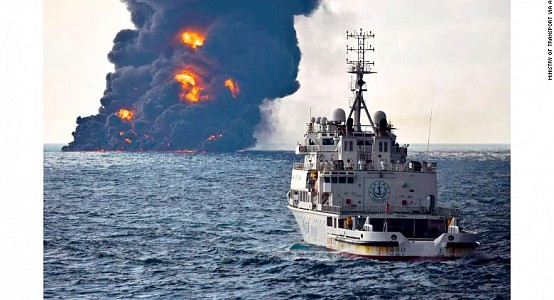Experts: Oil tanker accident off China’s coast could have a negative impact on ecosystem for decades

Beijing. January 17. Silkroadnews - Oil tanker accident off China’s coast could have a negative impact on ecosystem for decades, reports CNN.
“A massive oil tanker that sank off the coast of China could affect marine life for decades, environmentalists and experts say,” the report reads.
The Iranian tanker sank on Sunday, eight days after it collided with a cargo ship registered in Hong Kong resulting in fire and killing 32 crew members.
China’s State Oceanic Administration has said that several oil spills have already been found, including one nearly 15 kilometers long (9.3 miles) and another covering an area of 58 square kilometers (22.4 square miles).
Reportedly, the 900-foot-long tanker was carrying 136,000 tons - about 1 million barrels - of ultra-light crude oil. Environmentalists and officials are concerned that motor oil and fuel on board can harm the environment.
“The critical thing is to understand that when we put hydrocarbons into the oceans through events like this, it's going to affect a wide range of animals,” the agency quoted Jessica Meeuwig, a professor of biological science at the University of Western Australia.
Lu Kang, spokesperson for the Ministry of Foreign Affairs of China, said an investigation is already underway.
Water samples tested by the Chinese government showed a dangerously high concentration of oil around the spill.
According to Ma Jun, one of China’s leading environmentalist, this can have a detrimental effect on marine life.
“The collision site was within the area which considered to be one of the richest fishing grounds in China, the Zhoushan shipping ground,” Ma said.
“We still need to keep an eye on how these contaminants might be carried by the ocean flow to have the impact on the fishing ground.”
According to Greenpeace, the Zhoushan area is a spawning ground for several species of squid, and in winter the edible species such as crabs and mackerel live there. Previous incidents like Deepwater Horizon in the Gulf of Mexico have taught scientists that even if a spill is limited to a certain area or only immediately impacts certain species, it can still have a negative impact on entire ecosystems.
“The fact is that it goes all the way through the food chain,” Meeuwig said.
The tanker carried condensate, an ultra-refined, highly volatile form of ultralight crude oil, used to produce products such as jet fuel.
A condensate consisting of a mixture of hydrocarbons is lighter than ordinary crude oil, associated with spills such as Exxon Valdez. The high volatility of such oil means that it evaporates more easily than heavier crude. Most of the oil on board the Iranian tanker - although it is unclear how much - probably burned off after the crash, environmentalists say.
However, according to Greenpeace, it is impossible to estimate how much oil has burnt off or evaporated. There are some assumptions, less than 1% would remain on the surface of the sea five hours after the collision.
“The substance's volatility also explains why the tanker went up in flames so quickly, dooming the 30 Iranians and two Bangladeshi crew members on board the tanker, but not those aboard the other vessel involved in the collision. According to the Chinese Foreign Ministry, the crew on board the Sanchi died within an hour of the accident “because of the large-scale deflagration and the toxic gas”,” the report said.


